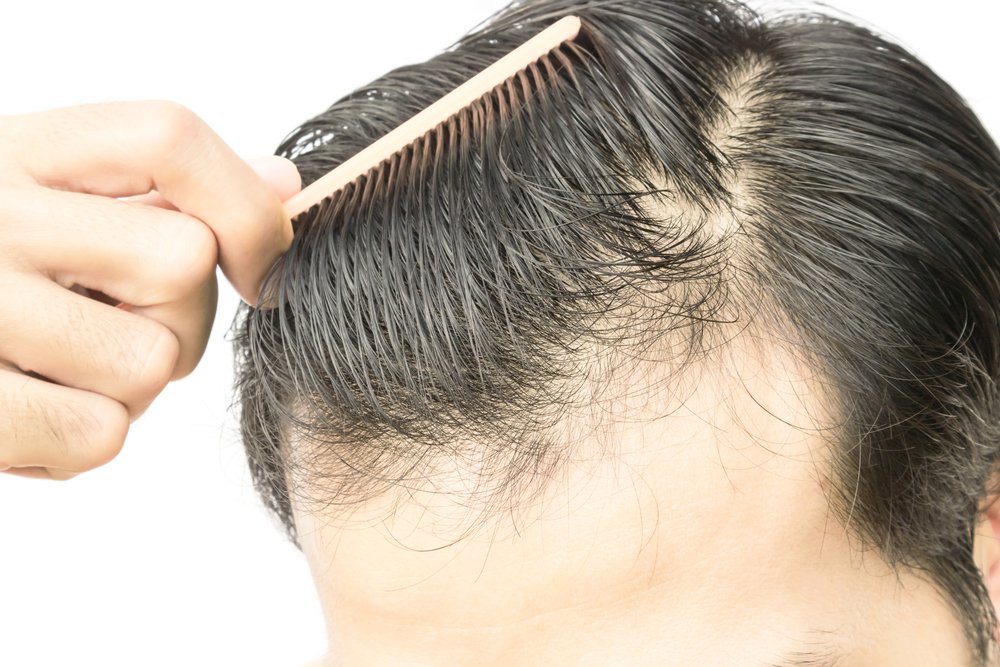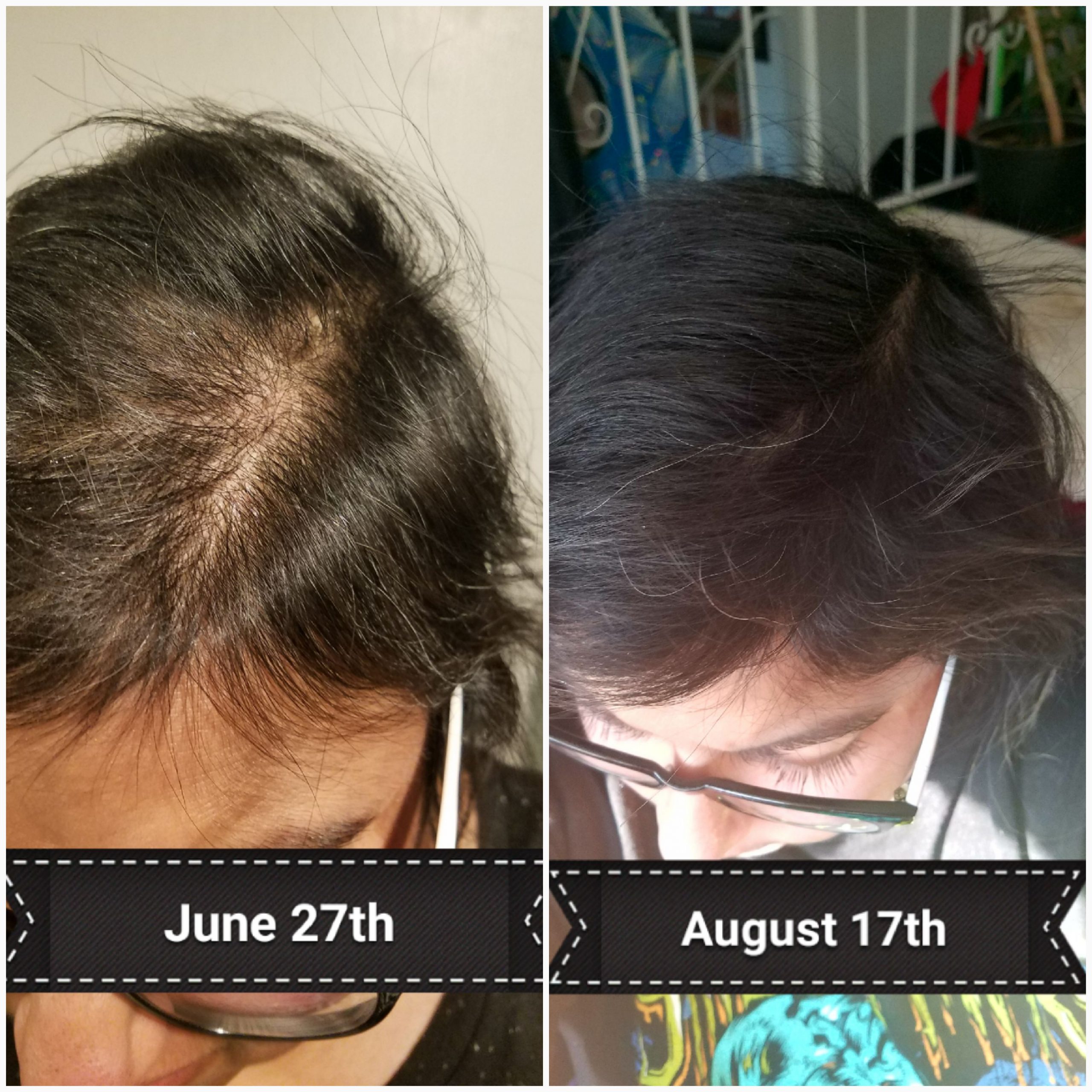Take Care Of Your Hair
To avoid even more lupus hair loss, there are a few things you can do to prevent it:
- Use a silk or satin pillowcase to prevent breakage
- Soften brittle hair with organic, unrefined coconut oil, the Hair Sentinel explains
- Run a humidifier at night to keep brittle hair hydrated
- Avoid heat, intensive shampooing, or coloring your hair
Chronically Brittany on YouTube talks more about how lupus hair loss affected her and provides inspiration and hope for dealing with hair loss.
Food You Need To Add To Your Diet
A. Omega 3 Rich Food:
Omega 3 rich food will help reduce the inflammation caused by lupus. Fish such as salmon, shrimp, mackerel are recommended for lupus patients. Walnuts, kidney beans, and seaweed also have a fair share of omega 3 in them.
B. High Calcium Food:
Dark leafy green vegetables, tofu, beans and dairy products contain a lot of calcium. Calcium intake is highly recommended for lupus patients as they may develop bone disorders.
C. Antioxidants:
Antioxidants help to reduce inflammation and prevent cell damage. Vitamin A, B and E are the best option for lupus treatment. Add fruits, vegetables, oats, and nuts to your meals. Also, green tea can be great if you are looking for antioxidants.
Foods You Need To Avoid
A. Garlic:
Garlic has allicin, ajoene, and thiosulfate that are great to boost the white blood cells to fight diseases. But in lupus, even a small amount of garlic can be harmful. In this condition, your hyperactive immune system will cause flare-ups.
B. Alfalfa Sprouts:
Alfalfa sprouts are rich in an amino acid called L-canavanine. It influences the immune system and makes it even more active which is not good for any lupus patient.
C. Echinacea:
It is a known ingredient found in supplement products to stimulate your immune system. If you are taking any supplements, make sure that they are free from echinacea.
Read Also: What Can Cause Sudden Hair Loss In Females
Other Causes Of Hair Loss
Other factors may contribute to hair loss in people living with lupus. Some hair loss is natural: People commonly shed as many as 100 hairs in a day.
Stress, too, can lead to hair loss, and if you are living with lupus, you may be experiencing stress from the condition and its impact on your life.Some drugs used to treat lupus can cause hair loss as a side effect. Members of MyLupusTeam have shared their experiences with different medications and their effects.
- I have been taking methotrexate for four months. Every week, I lose more and more hair.
- I have hair loss from Plaquenil, but Im in less pain.
- I am not sure whether it was the prednisone or the Plaquenil, but I lost just about all of my hair.
Nutrient Deficiencies Cause Lupus Hair Loss

Iron, biotin, and selenium are common deficiencies that affect us and our hair. We normally dont know our levels because doctors dont test for this unless we really push. So, reach out to a functional medicine doctor or find a doctor that will work with you on making your blood work in optimal ranges rather than normal ranges.
The difference between an optimal range and normal range is what determines your success with treatments for any chronic issue.
Many people still feel symptoms of fatigue, anxiety, brain fog, hair loss, and more due to fluctuating levels of various vitamins and hormones in your bloodwork. The ranges that are currently listed on your bloodwork are out of date and are too wide of a range for most.
An example would be your vitamin D levels. They should be between 60-90 ul, but your bloodwork states anywhere after 30-100 is okay. However, many studies suggest that your immune system functions much better and bone pain decreases when your levels are between 60-90 ul.
This has the biggest impact on long-term health goals.
Iron
Iron deficiency can cause hair loss. If hair follicles dont get enough oxygen, they rest and hair falls out. So, its important to check for this deficiency too.
Vitamin B12
This is one of the most common deficiencies in the US. If youre diabetic on metformin, take antiacid, have GI autoimmune diseases, youre even more likely to suffer from this. This deficiency causes premature hair loss and greying.
Biotin
Selenium
Also Check: How To Prevent Hair Loss At A Young Age
Treat Your Hair Gently
Take steps to prevent further damage to hair. I don’t color or put any chemicals , don’t blow dry, just wash, dry naturally, and comb gently, shared one MyLupusTeam member.
There are several ways to treat your hair gently.
- Try washing it with baby shampoo and leave-in conditioner, preferably containing sunblock. MyLupusTeam members have recommended hair care brands including Biota and Pura Dor.
- Avoid hairstyles requiring tight pulling or hair-rolling.
- Avoid chemical treatments, hair rollers and tongs, and alcohol-based styling products.
Limit Uv Light Exposure
Lupus can cause you to be more sensitive to light. This can lead to additional hair loss as the hair and scalp are damaged. There are several ways to limit exposure to UV light.
- Limit your exposure to the sun with layers of clothing. One MyLupusTeam member listed their many accessories for protecting their skin: I have a face mask, scarf, hat, summer jacket that is like wearing air, gloves and sleeves I keep in the car.
- Wear sunblock of SPF 50 or greater on any exposed skin including on your scalp.
- Wear a wide-brimmed hat or carry an umbrella.
- Stick to the shade outside whenever possible.
- Replace or remove any home lights that emit UV light.
Read Also: What Is The Best Volumizing Shampoo For Thin Hair
What Can You Do To Treat It
Lupus hair loss may be reversible, if you dont have discoid lesions. Hair loss will only reverse itself, however, if youre able to control the disease.
In addition to a corticosteroid and an immunosuppressant to manage symptoms, your doctor may prescribe an antimalarial drug to reduce lupus flares.
You may also receive biologics, which are intravenous drugs that can help relieve lupus symptoms. Follow your doctors instructions and take your medication as directed.
It can take weeks or months for lupus to go into remission. In the meantime, here are tips to help you cope with hair loss:
- Avoid sun exposure. The sun can trigger lupus flares and discoid lesions. Protect your skin and head when outdoors. Wear a hat and apply sunscreen.
- Change your medication. If you believe that your medication is contributing to hair loss, talk to your doctor and discuss alternative drugs, or perhaps reducing your dosage.
- Eat a healthy diet. A diet rich in fruits and vegetables may also slow hair loss. Also, ask your doctor about vitamins and supplements that can help strengthen your hair and reduce hair loss. Vitamins for hair growth include biotin, vitamin C, vitamin D, iron, and zinc.
- Limit stress. Certain factors can trigger a lupus flare and worsen hair loss. Stress is a known lupus trigger. To help reduce stress, try exercise and meditation. These 10 ways to relieve stress can also help.
- Get plenty of rest. Sleep between eight and nine hours a night
Stress Causes Lupus Hair Loss
When a stressful situation occurs, cortisol is supposed to tap into our blood glucose reserves to give the energy for flight or fight. When bodies dont complete this process, the system thinks it is in shock. Nervous shock can cause telogen effluvium or temporary hair loss in a non-patterned way.
Typically, hair grows in three stages:
AnagenHair growth stage where individual strands may grow roughly half an inch per monthCatagenFollowing the anagen phase, the catagen is the end of hair growth and lasts about 10 daysTelogenThis is a resting phase where the hair is released and falls out. After falling out, the hair follicle remains inactive for 3 months and then the process will repeat.The problem is when too many hair follicles go into the telogen phase especially at the same time and for an extended period of time.
Recommended Reading: Can Eczema Cause Hair Loss In Babies
Reversible Vs Irreversible Lupus Hair Loss
As Mollys Fund, a lupus organization, explains:
There are two main types of alopecia: scarring and non-scarring. Scarring means that the hair follicles have been destroyed by inflammation . Discoid lupus is one major cause of scarring alopecia. However, if caught early enough , it is possible to see hair regrowth. Non-scarring means that the hair follicles are still present and hair regrowth is possible.
Another type of reversible hair loss from lupus can occur based on which medications youre taking. Medications like prednisone, antimalarials, and immune system suppressants can actually lead to your hair loss, rather than the disease itself. Other related explanations include:
- Thyroid disorders
- Stress
- Nutritional deficiencies
For causes like medication use and stress, this hair loss can eventually be reversed leading to restored hair growth. Lets talk about some ways to reverse this lupus hair loss or prevent it in cases of discoid lupus.
How To Prevent Hair Loss From Lupus
This article was co-authored by Courtney Foster. Courtney Foster is a Licensed Cosmetologist, Certified Hair Loss Practitioner, and Cosmetology Educator based out of New York City. Courtney runs Courtney Foster Beauty, LLC and her work has been featured on The Wendy Williams Show, Good Morning America, The Today Show, The Late Show with David Letterman, and in East/West Magazine. She received her Cosmetology License from the State of New York after training at the Empire Beauty School – Manhattan.There are 11 references cited in this article, which can be found at the bottom of the page. This article has been viewed 80,094 times.
Lupus is an autoimmune disease where the body attacks itself. About half of all patients diagnosed with lupus experience hair loss. There are two types of hair loss associated with lupus. One is caused by the disease, and the other is caused by medication. Though some hair loss is unavoidable, there are some steps you can take to largely prevent it.XExpert SourceCertified Hair Loss PractitionerExpert Interview. 9 December 2019.
Don’t Miss: How To Manage Hair Loss
Is Lupus Hair Loss Permanent
Depending on the reason for the hair loss, it may be reversible or irreversible. Lupus hair loss due to inflammation is reversible. It is non-scarring, so the person can grow their hair back.
Although unfortunately, lupus hair loss from scarring lesions on the scalp is irreversible. The hair loss is permanent in this case.
Every Day You Lose About 50

While frequently benign and attributed to genetics, excessive shedding and thinning may also be attributed to a number of medical conditions. Itâs important to seek help from your physician if you notice significant and sudden changes in your hair.
One of the many conditions that may be responsible for noticeable hair loss is Lupus, an auto-immune disease that causes your immune system to attack parts of your own body which it mistakes for dangerous invading pathogens. Autoimmune disorders may damage major organs and tissues, wreaking havoc throughout the body.
Lupus affects about 5 million people worldwide. Anyone can experience Lupus, but itâs most common in women between the ages of 15 and 45 who are African-American, Hispanic or Asian-American.
When your immune system attacks, it may damage the heart, lungs, and even the skin and scalp, leading to hair loss. While losing your hair may not be life-threatening, dealing with the psychological effects of your changing appearance may make coping with the illness that much more stressful.
The symptoms can vary dramatically, depending on which organs your immune system is at-tacking. About half of all people with Lupus will experience some form of hair loss. You may notice gradual, overall thinning of the hair on the scalp or sud-den hair loss, resulting in clumps and patches falling out at once. The hair at your hairline may become brittle, thin and weak, causing breakage.
Read Also: Can Too Much Zinc Cause Hair Loss
Lupus And Hair Loss: Causes Treatments And More
Lupus, also known as systemic lupus erythematosus or SLE, is a complicated autoimmune disease that can have a wide range of effects on a persons health, including thinning hair and hair loss. While hair loss might not be the most severe of symptoms associated with lupus, it can add to the stress and challenge of managing this condition.
Read on to understand the connection between lupus and hair loss, how its treated and find out which products you should use to support thicker, fuller, healthier hair.
Systemic Lupus Hair Loss Non
- Systematic lupus If the hair loss is caused due to systematic lupus, then it is known as telogen effluvium. It is basically caused due to severe illness that flares up the inflammation on the scalp and face.
- In systematic lupus, you may see hair loss to be most pronounced in the frontal area of the scalp. But, it can happen in different areas.
- This is preventable, treatable, and your hair tends to grow back, but it never grows back the same unless you do what Lupus warriors find so very helpful. Ill get into those details shortly.
You May Like: What To Help With Hair Loss
Does Lupus Cause Hair Loss Or Alopecia
Unfortunately, lupus can cause hair loss for many patients. Hair loss is known medically as alopecia. If you have hair loss related to lupus, you may experience:
- Hair that falls out in clumps
- Thinning in the eyebrows, eyelashes, or beard
- Overall thinning of your hair
- A change in hair texture, causing brittle or ragged hair
- Worse symptoms during flare-ups
For some, this lupus hair loss may only be temporary. Others may suffer from more permanent changes to their hair.
Keep Your Hair Moisturized
Dry strands break more easily, so keep your locks luscious with a good conditioner after shampooing. Speaking of shampoo: skip shampoos that might strip hair of natural moisture by avoiding ingredients like sulfates, and opt instead for shampoos that have been developed to nourish both your scalp and strands.
VEGAMOUR’sGRO Revitalizing Shampoo and Conditioner kit contains a revolutionary chemical-free vegan keratin, Karmatin, a microencapsulated vegan b-silk protein that’s designed to help soothe damaged follicles while making strands soft and shiny.
You May Like: Does Dht Cause Hair Loss
When To See A Healthcare Provider
A health care professional should evaluate any type of excessive shedding or hair loss. Your hair loss may be caused by a condition other than your lupus, or you may have a combination of hair loss from lupus and something else.
Skin lesions on the scalp should be treated promptly to prevent scarring and permanent bald spots. Call your rheumatologist immediately if you have a lesion or rash on your scalp. You should also call the office if you are losing clumps of hair or if the hair loss coincides with starting a new medication.
People with lupus generally see their rheumatologist every three to four months. If you are experiencing mild hair loss, be sure to tell your healthcare provider at the next appointment.
While hair loss can be a side effect of certain medications, it is also associated with conditions unrelated to lupus, such as anemia and thyroid disease. Your doctor may take blood work to rule out other potential causes of hair loss.
Embrace Your Changing Hair
Everyone deals with hair loss differently. Some people choose to embrace their hair loss by shaving their heads completely or by doing nothing at all.
Remember, theres no right way to deal with hair loss. The most important thing is to do what feels right to you.
As a trichologist and certified cranial prosthesis manufacturer Assunta is an expert in hair and scalp and specifically designs wigs for people that have medically-related hair loss. Watch the video to learn about some of her expert tips for hair retention and wig guidance.
Read Also: Do Natural Hair Loss Remedies Work
Though More Studies Are Needed Researchers Believe There’s Enough Evidence To Consider Hair Loss An Indicator Of Active Disease In Lupus
Hair loss can be a common symptom of lupus, as body-wide inflammation can impact the skin and hair follicles. Most of the time, people who get diagnosed with systemic lupus find that their hair grows back once they start treatment, but thats not always the case.
According to a new study, lupus patients whose hair loss persists or comes back after abating might have higher levels of disease activity.
The study, which was published in the Journal of the American Academy of Dermatology, only included 32 patients, so its too small to draw any widespread conclusions about what hair loss might mean for most people with lupus. Still, the researchers believe theres enough evidence to consider hair loss an indicator of active disease.
In the study, researchers examined 32 lupus patients with different patterns of alopecia : 14 had mild alopecia five had severe alopecia nine had patchy alopecia and four had lupus hair, which refers to fragile/broken hair along the hairline. They analyzed hair samples and scalp biopsies from these patients and conducted the same analyses on an additional 10 participants who had lupus but no signs of alopecia.
Avoiding Your Lupus Triggers

Recommended Reading: What Dr To See For Hair Loss